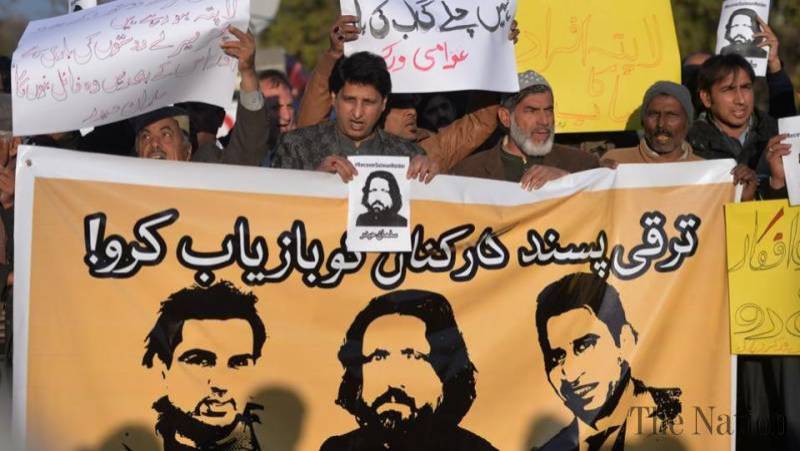At least six activists have been reported missing within a week. The editorial in this newspaper was correct in emphasising “that the near-simultaneous disappearances are linked since all four of the activists shared the same approach, were critical of government and establishment policies and were prominent online and on social media.”
The space for expression and dissent appears to be increasingly shrinking. That notable individuals like Salman Haider, a human rights activist and professor at Fatima Jinnah University, can vanish in broad daylight from the capital, is a frightening revelation that people’s prominence and profiles can offer no protection or deterrence from the danger and threat of disappearance.
A few weeks back, a small and peaceful demonstration by the Democratic Students Alliance in Lahore, organised in response to the Islam Bachao rally taken out earlier, was stopped and the participants detained at the Racecourse police station for several hours. This crackdown on the peaceful practice of basic constitutional rights and freedoms, along with recent developments, is a grim start to the New Year for the country.
Pakistan’s civil society is neither ignorant nor impervious to repression. In fact, it has possessed a history riddled with struggles against censorship, suspension of civil liberties, arbitrary arrests, and persecution under the various dictatorial regimes. However, to witness the revival and replication of these measures and instruments during the stint of a democratic government is an alarming, outrageous and deplorable stain on its claims of a democratic character and credentials.
A glance back at the last two or three years also yields a bleak picture associated with a deteriorating situation spanning academic freedoms, press freedoms and civil liberties in the country.
With regards to this, a profile of Mohammad Hanif in the New Yorker aptly captured the constraints of the English-language press in Pakistan and encapsulated a series a incidents related to their breach:
“The Pakistani press corps works with a strange mixture of privilege and constraint. Pick up one of the better English-language newspapers—the News or the Dawn—and you will find penetrating coverage of national security, poverty, and governmental corruption. But, beyond shifting and mysterious boundaries, no journalist may stray without risk. In 2010, Umar Cheema, who had written about dissent within the military, was picked up by men in police uniforms who were widely presumed to be ISI agents. They shaved his head, sexually humiliated him, and dropped him miles from his home, with a warning to stop. The following year, Saleem Shahzad published stories asserting that the armed forces had been infiltrated by Al Qaeda. He was beaten to death and his body dumped in a canal.”
In 2015, a scheduled panel discussion on the “history, complications, human rights abuses, and the struggle for justice that has been going on in Balochistan” at the Lahore University of Management Sciences was forcibly booted and cancelled after ‘external’ intervention.
In 2016, there occurred the passage of measures such as the Cyber Crime Bill and the move to condemn Cyril Almeida, after much fuss and furor, to the Exit Control List, after his report on civil-military relations.
It is both interesting and worrying to note that discussions within spheres such as a private, often touted as elite, university in an urban provincial capital, and a leading English language newspaper, which were previously considered largely off-limits to state encroachment, now risk subjection to the control of a state, a political, military and intelligence establishment, that seems to be growing increasingly intolerant of any sign of dissent or criticism.
If the disappearances of these activists has been orchestrated in order to stifle criticism of state institutions and policies, it a short-sighted move since, in addition to protests and rallies across cities, the disappearances are being covered by major national and international media outlets and human rights organisations.
Dissent, criticism, difference of opinion, and activism are critical for a living society, and central to a robust democracy. It appears, however, that some state organs or some actors in the country wish to stem these in their myopic drive to steer Pakistan into ruin.
The sudden spurt of blasphemy allegations and accusations of being “anti-Islam” directed at some of the missing activists also poses a perilous situation for them even if they are recovered, since the mere suspicion of blasphemy is enough to continually and permanently endanger an individual’s life in Pakistan.
It is still hoped that the activists will be recovered safe and sound, however, even if they return, the climate of fear and intimidation engendered by their disappearances will remain. The message of these disappearances is hard to miss: quieten or be silenced.
A strongly-worded editorial in Dawn brought to light an important assumption and accusation operating in this entire issue: “The sanitised language — ‘missing persons’, ‘the disappeared’, etc — cannot hide an ugly truth: the state of Pakistan continues to be suspected of involvement in the disappearance and illegal detentions of a range of private citizens.”
The matter of “disappeared” and “missing” persons began in Balochistan, and today it has reached the capital. There is no escape for the state from this, for it is either complicit or it is incompetent. And for the rest of the country, these are ominous signs.






